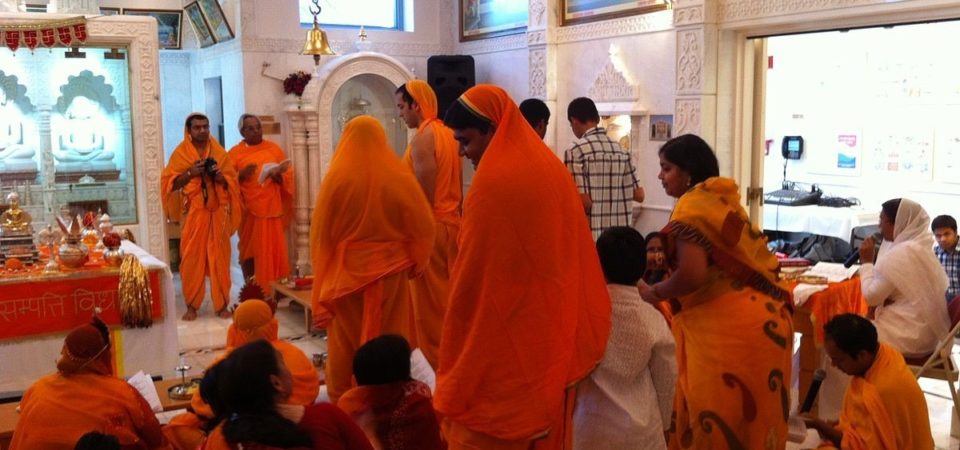Often when struggling with the daunting and discouraging environmental issues confronting humanity, I reflect on the strategy of the Jains and its central teaching of nonviolence. While this religious approach may not suit all, I believe there are some principles which could be shared more broadly to become part of the foundation of a sustainable future built on principles of respect, compassion, and discipline. This week, I consider the Jain Festivals of Paryushan and Das-Lakshan, which are currently being celebrated from August 29-September 15, 2016.
The Jain community, like other communities throughout the world, celebrates many social and religious functions annually. The most prominent and important Jain festival, popularly known as Paryushan Parva, is organized every year between August and September. Two popular components of this festival: Paryushan Parva and Das Lakshan Parva are celebrated by Jains throughout the world over an 18 day period Paryushan (8 days) and Das Lakshan (10 days). The mode of performance and aims of both the festivals are the same and might hold some important lessons for how we can better live in harmony with ourselves, all living beings, and the environment.
Origin of most of the festivals in the world are generally to celebrate: (1) An historic event (such as the Fourth of July or Victory Day Celebration, (2) The birthday of some important person such as October 2nd as Mahatma Gandhi’s birthday, Christmas Day, or (3) The contributions of some groups or persons such as Labor Day, Memorial Day, Thanksgiving Day etc. In most of these festivals, there is pomp, show, lighting, decorations, dancing, gifts and presents, ceremonies, parades, tributes, merrymaking, drinking and eating.
In contrast, the Jain festivals of Paryushans are based on spiritual purification to attain its pure state. They aim at self-improvement. The emphasis here is on giving up things and vices, on self-discipline and controlling the wants and desires through fasting and other ascetic practices. The underlying idea of these festivals and their interpretation is that it is a celebration through which the karmic (deed) matter attached to the soul is totally burnt or vanquished (both internally and externally). Truly these are the festivals of self-purification.
Men, women, and children as well as monks and nuns participate in the celebration of Paryushan. In these celebrations, Jains contemplate on the wellbeing, peace and happiness of the common man. These celebrations harbinger social harmony and amity and preach the lofty Jain motto ‘Live and help others to live’. Paryushan is a period of sincere and deep contemplation, meditation, spiritual studies, atonement, asking forgiveness, dialog of the self with the self, fasting and taking a personal stock of the whole year: what, where and why did I as an individual resort to hurt and violence (mentally, verbally and physically) to others around me with whom I come in contact with in my life.
Asking Forgiveness
On the last day, each person asks for forgiveness from those who have been so hurt and also grants forgiveness to those who might have done wrong to me as a person. This is a sincere attempt (without the support and help of anyone else) and is done unconditionally with the family members, friends, relatives, servants, enemies and co-workers. The sounds of michchhami Dukkhadam and Uttam Kshama (I seek and grant forgiveness) reverberate within the entire Jain community.
There are several great aphorisms (Sutras) to ask for forgiveness with the unity of the body, speech and mind, and the following two most common ones are:
Khämemi Savve Jivä, Savve Jivä Khamantu Mi
Mitti Me Savva bhuesu, Veram majjham na Kenai.
Meaning: I forgive all the living beings of the universe, and may all the living-beings forgive me for my faults. I do not have any animosity towards anybody, and I have friendship for all living beings.
Jam jam manen vaddham, jam jam vaayen bhaasiyam paavam,
Jam jam kaayen kadam, tas michchhaami dukkdadam
Meaning; whenever and wherever I have thought of ill of others, spoken bad words and harmed any one physically, I sincerely ask for forgiveness from them.
The process of shedding our karmas (deeds) really begins by asking for forgiveness with true feelings, and to take some vows not to repeat mistakes. The quality of the forgiveness requires humility (vinay –absence of ego) and suppression of anger. Therefore, the real purpose of the Paryushan is to purify our soul by staying closer to our own soul, to look at our own faults, to ask for forgiveness for the mistakes we have committed, and to take vows to minimize our faults. We try to forget about the needs of our body (like food) and our business so that we can concentrate on our-self.
Paryushan Parva is a grand Jain festival of self-introspection, self-enlightenment and self-achievement. Its teachings and celebrations hold tremendous lessons for how we all, not just Jains, can live in better harmony with ourselves, all living beings, and the environment.
 Dr. Sulekh C. Jain currently serves as the Chairman and member of the Governing Council for the Inerntaional School for Jain Studies, North America; and previously served as President of the Federation of Jain Associations in North America (JAINA). Dr. Jain also authored the book An Ahimsa Crisis: You Decide, which can be accessed as an eBook free of charge. Dr. Jain can be contacted at scjain [at] earthlink [dot] net.
Dr. Sulekh C. Jain currently serves as the Chairman and member of the Governing Council for the Inerntaional School for Jain Studies, North America; and previously served as President of the Federation of Jain Associations in North America (JAINA). Dr. Jain also authored the book An Ahimsa Crisis: You Decide, which can be accessed as an eBook free of charge. Dr. Jain can be contacted at scjain [at] earthlink [dot] net.
MAHB-UTS Blogs are a joint venture between the University of Technology Sydney and the Millennium Alliance for Humanity and the Biosphere. Questions should be directed to joan@mahbonline.org.
MAHB Blog: https://mahb.stanford.edu/blog/jain-festivals/
You can learn more about Jainism through Michael A. Giannelli, Ph.D.’s article Why I Admire Jains, which appeared in Jain Spirit in 1999.
The views and opinions expressed through the MAHB Website are those of the contributing authors and do not necessarily reflect an official position of the MAHB. The MAHB aims to share a range of perspectives and welcomes the discussions that they prompt.
